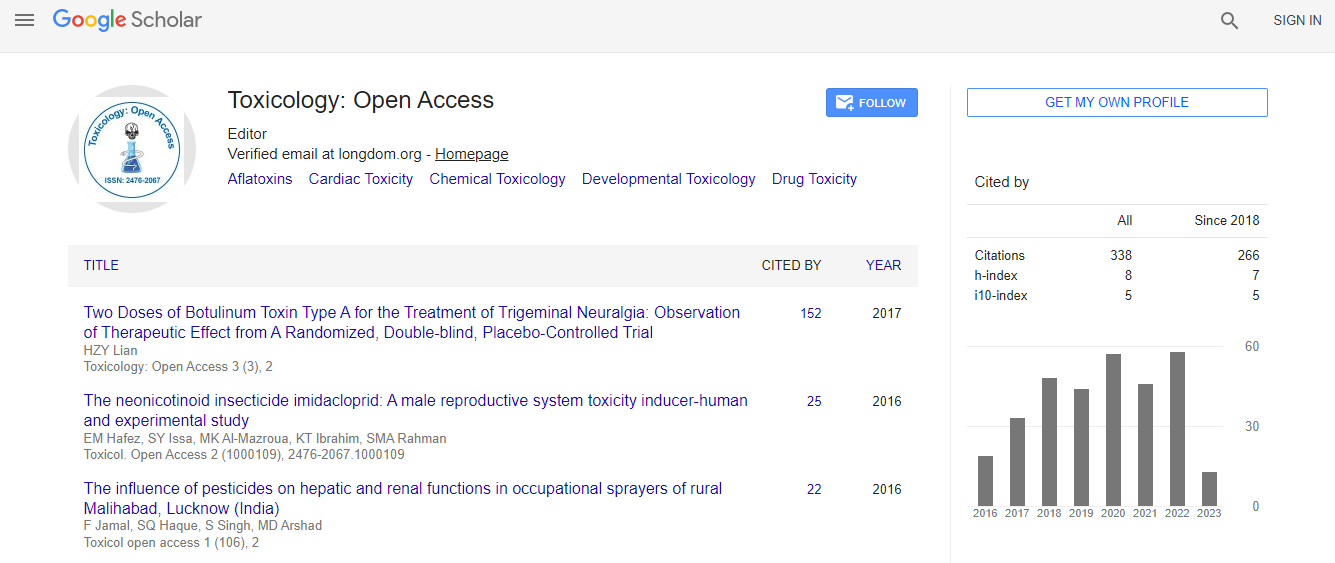Our Group organises 3000+ Global Conferenceseries Events every year across USA, Europe & Asia with support from 1000 more scientific Societies and Publishes 700+ Open Access Journals which contains over 50000 eminent personalities, reputed scientists as editorial board members.
Open Access Journals gaining more Readers and Citations
700 Journals and 15,000,000 Readers Each Journal is getting 25,000+ Readers
Google Scholar citation report
Citations : 336
Toxicology: Open Access received 336 citations as per Google Scholar report
Indexed In
- Google Scholar
- RefSeek
- Hamdard University
- EBSCO A-Z
- Geneva Foundation for Medical Education and Research
- Euro Pub
- ICMJE
Useful Links
Related Subjects
Share This Page
Allyl isothiocyanate induces apoptotic mechanism via endoplasmic reticulum stress and mitochondrial pathway in human colorectal cancer HT29 cells
8th World Congress on Toxicology and Pharmacology
Jo-Hua Chiang, Chi-Cheng Lu and Jai-Sing Yang
Chung-Jen Junior College of Nursing, Health Sciences and Management, Taiwan China Medical University, Taiwan
Posters & Accepted Abstracts: Toxicol Open Access
Abstract
Allyl isothiocyanate (AITC), one of isothiocyanate (ITC) family found in a constituent of cruciferous vegetables, has chemopreventive and antitumor activities in several cancers. However, no available information showed antitumor effects on human colorectal cancer cells. The current study was focused to explore mechanisms underlying AITC-induced apoptosis in human colorectal cancer HT29 cells. The results showed that AITC reduced cell number and viability using trypan blue stain by countess automated cell counter as well as utilizing MTT assay, respectively. AITC also was observed to induce apoptotic cell morphological changes by a contrast-phase microscope and cell cycle arrest at G2/M phase by flow cytometric assay in HT29 cells. Intrinsic apoptosis-associated factors such as caspase-9 and caspase-3 activities were performed. The levels of reactive oxygen species (ROS) production, release of cytosolic Ca2+, loss of mitochondrial membrane potential (���¨m) occurred in AITC-treated HT29 cells. AITC stimulated mitochondria-related signaling, including cytochrome c, Apaf-1, AIF and Endo G in HT29 cells. We further found that calpain 1, ATF-6�±, GRP78, GRP94, GADD153 and capase-4 signals were up-regulated in HT29 cells after AITC challenge. Importantly, NAC (an ROS scavenger) and BAPTA (a selective Ca2+ chelator) abolished AITC-reduced viability in HT29 cells. Additionally, AITC down-regulated CDK1 activity and altered the expressions of G2/M phase-modulated associated protein levels by Western blotting in HT29 cells. Therefore, our findings demonstrated AITC can promote G2/M phase arrest and trigger HT29 cell apoptosis through ER stress and mitochondria-dependent pathway. AITC possibly exhibits as a potential anticancer agent and could be applied in the treatment of human colorectal cancer.Biography
Jo-Hua Chiang received her PhD degree in Life Sciences at National Chung Hsing University (NCHU), Taichung, Taiwan. She then worked as a Post-doctoral Fellow with distinguished chair Professor Tian-Shung Wu of the Department of Chemistry, National Cheng Kung University, Tainan, Taiwan. She is currently an Assistant Professor at the Department of Nursing, Chung-Jen Junior College of Nursing, Health Sciences and Management, Chiayi County, Taiwan. She has worked in the area of anticancer molecular signaling. Her fields of interest include phytochemicals, herbal medicine and the synthesis of novel compounds against multiple cancer cells and antiangiogenic actions in vitro and in vivo.
Email: j588011430@gmail.com

 Spanish
Spanish  Chinese
Chinese  Russian
Russian  German
German  French
French  Japanese
Japanese  Portuguese
Portuguese  Hindi
Hindi 